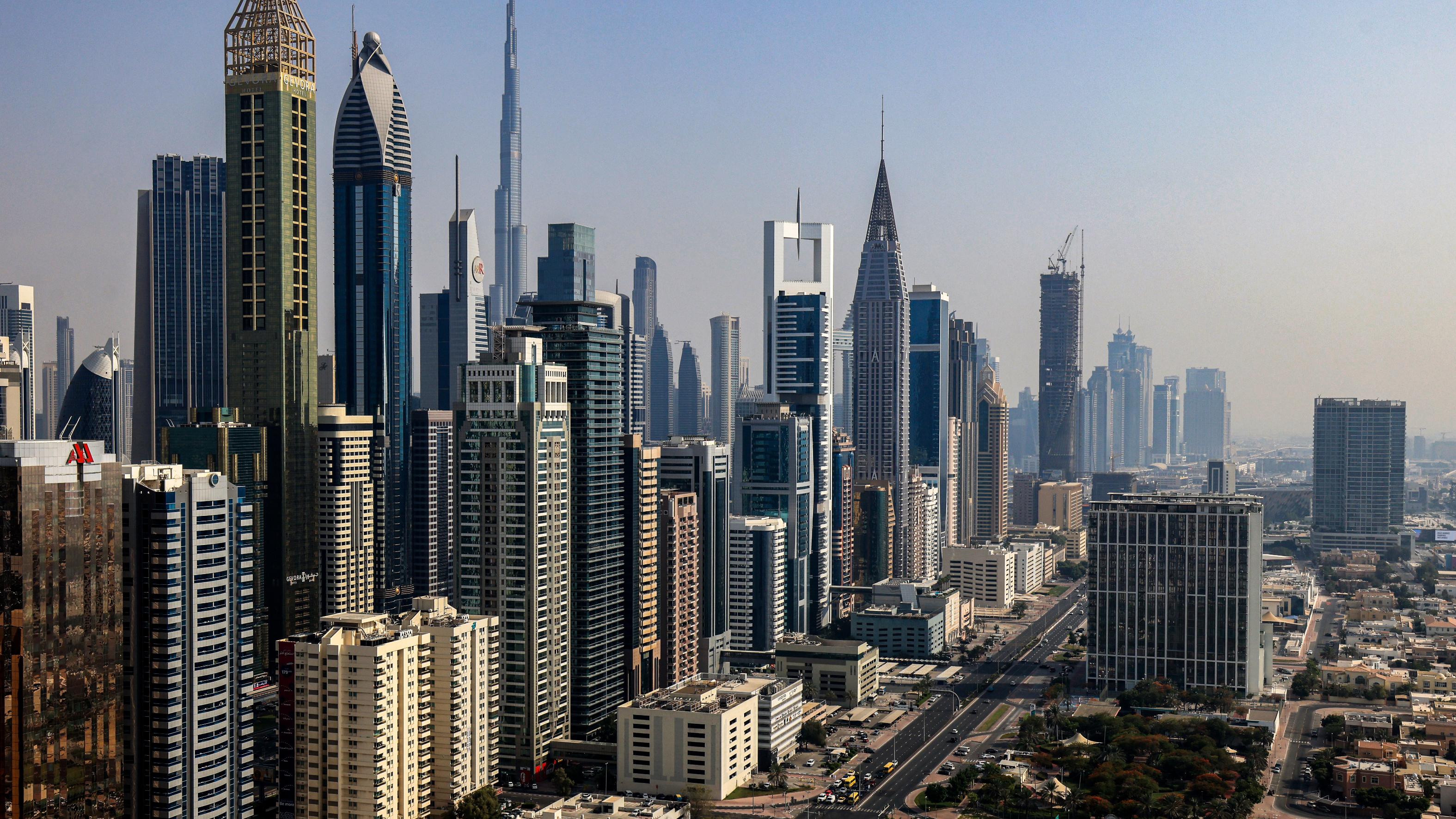 High-rise tower buildings are pictured along the central Sheikh Zayed Road in Dubai on July 3, 2023. (PHOTO / AFP)
High-rise tower buildings are pictured along the central Sheikh Zayed Road in Dubai on July 3, 2023. (PHOTO / AFP)
The United Arab Emirates’ four-month ban on rice exports and re-exports will have ripple effects on distribution networks for the vital food grain, and underscores the need to strengthen resiliency, and food and nutrition security in the Middle East region, experts said.
Meanwhile, the move could drive a realignment of trade dynamics, opening opportunities for other rice exporters to close the supply gap through market penetration and development, they said, also noting the possibility that the rice curbs could prompt consumers to look at alternative grains.
According to a study published by the Trade Development Authority of Pakistan, the Middle East is a leading consumer of basmati rice which it imports from India and Pakistan and is responsible for as much as 37.8 percent of the total rice consumption
Victor Afari-Sefa, director of the Enabling Systems Transformation Program at The International Crops Research Institute for the Semi-Arid Tropics, or ICRISAT, said the UAE ban “has profound implications and opportunities across the Middle East region”.
READ MORE: Food security top priority amid global climate impacts
Supply chain disruptions are likely to ripple through established rice distribution networks, potentially leading to shortages and price fluctuations in the Middle East, highlighting the pressing need for the region to prioritize domestic food production and invest in agricultural food self-sufficiency to ensure long-term food, as well as nutrition, security, he told China Daily.
ICRISAT, which is headquartered in Hyderabad, India, announced in June a partnership with the Food and Agriculture Organization of the United Nations and Saudi Arabia to enhance the productivity of millet and sesame crops in Saudi Arabia.
Afari-Sefa said the UAE ban “catalyzes a broader conversation about trade diplomacy, sustainable food practices, and the critical importance of fortifying regional food supply chains for improved nutrition of the populace”.
The UAE last month announced a four-month ban on rice exports and re-exports, with effect from July 28, covering the free zones in the UAE and all rice varieties. Companies that wish to export or re-export must apply for an export permit.
The UAE export halt came after India — which accounts for 40 percent of global rice exports — announced earlier in July that it was suspending the exportation of non-basmati rice, citing significant crop damage due to heavy monsoon rains, and price rise in the domestic market.
“There is a clear incentive for Middle Eastern nations to channel efforts into bolstering local agricultural sectors, cultivating rice and other staple foods, particularly, micro-nutrient dense types, where comparative advantage opportunities can be developed in the long term,” said Afari-Sefa.
“This could mitigate reliance on imports, enhance food and nutrition security, and stimulate economic growth.”
Afari-Sefa added that the ban “might prompt a shift in consumer behavior, encouraging exploration of alternative grains and driving demand for diversified food options, including fortified nutricereals such as millets, quinoa and, to some extent, pulses (grain legumes)”.
The UAE’s move is seen impacting some import-reliant countries, like Zimbabwe, Benin, and Somalia, which are dealing with their own food security challenges.
Deniz Istikbal, an economics researcher at the Foundation for Political, Economic and Social Research, a think tank based in Ankara, Turkiye, told China Daily that even before the ban, many countries have already been experiencing food inflation, as a result of the COVID-19 pandemic and the Russia-Ukraine conflict.
He is optimistic that the impact could be managed and would allow policymakers to develop some solutions to block an increase in food prices, as they “are afraid of political and economic instability” and because the world economy “is not ready for another rise in food prices”.
Anis Khayati, an economics professor at the College of Business Administration at the University of Bahrain, noted that most Gulf Cooperation Council (GCC) countries had announced that they would not be affected by any crisis related to the global shortage of rice, because they possess sufficient stocks of the grain, in addition to not consuming a large amount of the type that India has banned from exporting.
“However, white rice is usually bought by people with limited income, and their proportion is not small in most GCC countries,” Khayati said.
“Also, white rice is vital in some African countries such as Sudan, Djibouti and Ethiopia, and the UAE decision will clearly induce higher prices, (which) will increase inflationary pressures and cause a deterioration in consumers’ condition in Africa,” he said.
Local media in the GCC region have reported in recent weeks that the region has sufficient rice stocks lasting from 6 months to one year. Basmati rice is a staple in GCC diets.
READ MORE: China shares practices in protecting global food security
According to a study published by the Trade Development Authority of Pakistan, the Middle East is a leading consumer of basmati rice which it imports from India and Pakistan and is responsible for as much as 37.8 percent of the total rice consumption.
Afari-Sefa, from ICRISAT, said as rice faces restriction amid the UAE’s four-month exports ban, consumers may flock to alternative grains, potentially driving up prices for wheat, barley, quinoa, and millets.
“This surge in demand could disrupt the equilibrium between supply and demand. Additionally, the quest for substitutes might trigger a domino effect, boosting demand for crops globally and redirecting trade flows,” he said.


